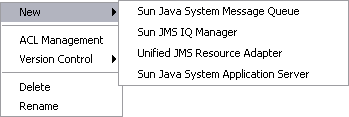| Skip Navigation Links | |
| Exit Print View | |

|
Creating an Oracle Java CAPS Runtime Environment Java CAPS Documentation |
| Skip Navigation Links | |
| Exit Print View | |

|
Creating an Oracle Java CAPS Runtime Environment Java CAPS Documentation |
Creating a Runtime Environment
Building a Runtime Environment
To Create and Populate a Runtime Environment
Using the Environment Context Menu
Using Environment Component Context Menus
Adding Environmental Constants
Adding Scheduler External Systems
Figure 6 Logical Host Icon
You can create this component by selecting the New > Logical Host option from the Environment context menu in the NetBeans Services window.
A domain is an instance of a Logical Host; that is, the Logical Host used in Java CAPS acts as a directory for the domains, which are the actual runtime components. Each domain consists of two main components: an application server and a message server.
Note - The Java CAPS runtime components, which include domains and any Projects or components deployed to them, provide their full functionality independent of the Repository.
Right-clicking a Logical Host in the NetBeans Services window displays the context menu shown below.
Figure 7 Logical Host Context Menu

Table 4 Logical Host Context Menu Options
|